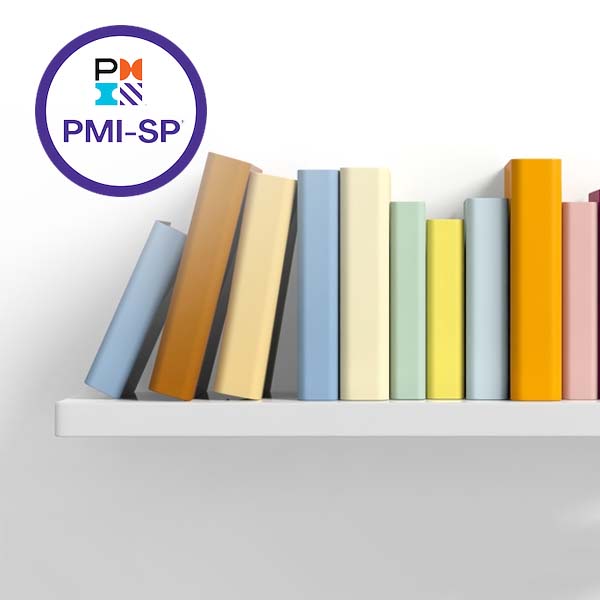
This article introduces the PMI-SP exam preparation books that I used to pass the PMI-SP exam. Highly recommended for PMI-SP certification aspirants, considering I passed the PMI-SP exam from my first attempt.
Reference One: Must use!
GUIDE TO THE PROJECT MANAGEMENT BODY OF KNOWLEDGE (PMBOK GUIDE)–SIXTH EDITION
The PMBOK® Guide–Sixth Edition – PMI’s flagship publication has been updated to reflect the latest good practices in project management. New to the sixth edition, each knowledge area will contain a section entitled approaches for agile, iterative and adaptive environments, describing how these practices integrate in project settings. It will also contain more emphasis on strategic and business knowledge—including discussion of project management business documents—and information on the PMI Talent Triangle™ and the essential skills for success in today’s market.
It organizes the exam syllabus material through the process groups, starting by the project management framework, initiating process groups (2 processes), planning process group (24 processes), executing process group (10 processes), monitoring and Controlling process group (12 processes), closing process group (1 process). As you are using this book to prepare for the PMI-SP exam, you need to focus on the scope management, cost management, schedule management, communication management, and stakeholder management chapters. Expect questions from all these chapters in the real PMI-SP exam.
Agile Practice Guide – First Edition has been developed as a resource to understand, evaluate, and use agile and hybrid agile approaches. This practice guide provides guidance on when, where, and how to apply agile approaches and provides practical tools for practitioners and organizations wanting to increase agility. This practice guide is aligned with other PMI standards, including A Guide to the Project Management Body of Knowledge (PMBOK® Guide) – Sixth Edition, and was developed as the result of collaboration between the Project Management Institute and the Agile Alliance.
About the author
The Project Management Institute (PMI) is a US nonprofit professional organization for project management. The PMI provides services including the development of standards, research, education, publication, networking-opportunities in local chapters, hosting conferences and training seminars, and providing accreditation in project management. PMI has recruited volunteers to create industry standards, such as “A Guide to the Project Management Body of Knowledge”, which has been recognized by the American National Standards Institute (ANSI). In 2012 ISO adapted the project management processes from the PMBOK Guide 4th edition.
Preview the Guide to the Project Management Body of Knowledge (PMBOK Guide)–Sixth Edition
You can take a look and read dozens of pages of the Guide to the Project Management Body of Knowledge (PMBOK Guide)–Sixth edition by project management institute by clicking the link below. You will be redirected to amazon website where you can flip through the book just as you are holding it in a bookstore, refer to the link here for FREE preview. If you don’t prefer a paper book, you can preview the Kindle Edition here.
Reference Two: Must use!
PRACTICE STANDARD FOR SCHEDULING, 3RD EDITION
The Practice Standard for Scheduling – Third Edition provides the latest thinking regarding good and accepted practices in the area of scheduling for a project. Aligned with A Guide to the Project Management Body of Knowledge (PMBOK® Guide) – Sixth Edition, this updated practice standard expounds on the information contained in Section 6 on Project Schedule Management of the PMBOK® Guide
The Project Management Institute provides services including the development of standards, research, education, publication, networking-opportunities in local chapters, hosting conferences and training seminars, and providing accreditation in project management.
In this new edition of the practice standard, you will learn to identify the elements of a good schedule model, its purpose, use, and benefits. You will also discover what is required to produce and maintain a good schedule model. Also included in the third edition: Description of scheduling, Definition of schedule model, Uses and benefits of the schedule model, Definitions of key terms and steps for scheduling, Detailed descriptions of scheduling components, Guidance on the principles and concepts of schedule model creation and use, Descriptions of schedule model principles and concepts, Differences between schedule models, schedule model instances, and presentations, Detailed descriptions of critical path method, critical chain, program evaluation and review technique (PERT), rolling wave planning, and Monte Carlo simulation, Uses and applications of adaptive project management approaches in scheduling, such as agile, Guidance and information on generally accepted good practices associated with the planning, development, maintenance, communication, and reporting processes of an effective schedule model.
Preview the practice standard for scheduling
You can take a look and read dozens of pages of this standard by clicking the link here. You will be redirected to amazon website where you can flip through the book just as you are holding it in a bookstore.
Reference three: Must use
GUIDE TO THE PROJECT MANAGEMENT BODY OF KNOWLEDGE (PMBOK GUIDE)–SEVENTH EDITION
Over the past few years, emerging technology, new approaches and rapid market changes have changed the world of work, driving the profession to evolve. A Guide to the Project Management Body of Knowledge (PMBOK® Guide) – Seventh Edition has been updated to meet these challenges, better align to how people work today and help you be more proactive, innovative and nimble. This edition of the PMBOK® Guide:
Reflects the full range of development approaches (predictive, traditional, adaptive, agile, hybrid, etc., provides an entire section devoted to tailoring the development approach and processes, expands the list of tools and techniques in a new section, “Models, Methods, and Artifacts”, focuses on project outcomes in addition to deliverables, integrates with PMI standards+™ for access to content that helps the user apply the PMBOK® Guide on the job, and including both The Standard for Project Management and the PMBOK® Guide, this modern edition presents 12 principles of project management and eight project performance domains critical for the effective delivery of project outcomes.
Preview the PMBOK 7th Edition.
You can take a look and read dozens of pages of the PMBOK 7th edition published by PMI clicking the link below. You will be redirected to amazon website where you can flip through the book just as you are holding it in a bookstore, refer to the link here for FREE book preview.
.jpg)
.jpg)
.jpg)


